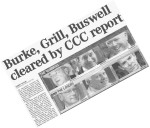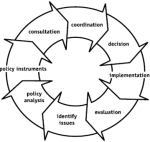Category Archives: Change
Queensland Government is in “Caretaker Mode”
 Now the State election has been called – see https://ethicalconsultingservices.wordpress.com/2017/10/29/queensland-state-election-basics/ – the Government moves into what is called “Caretaker Mode”.
Now the State election has been called – see https://ethicalconsultingservices.wordpress.com/2017/10/29/queensland-state-election-basics/ – the Government moves into what is called “Caretaker Mode”.
Caretaker Mode is all about both maintaining public sector impartiality, and ensuring no decisions or commitments are made which will bind a new, possibly unwilling Government, post-election.
Many public servants interpret this incredibly widely – far more so than is intended or appropriate, and this can be a real nuisance for anyone trying to do business with the State Government.
Official guidelines for the conventions which apply during the caretaker period are set out in the Cabinet Handbook, section 9, here https://www.premiers.qld.gov.au/publications/categories/policies-and-codes/handbooks/cabinet-handbook/caretaker-conventions.aspx.
In summary:
- Caretaker conventions are merely conventions and not binding at law – but are nearly always adhered to;
- Caretaker period starts the moment the election is called and lasts until either te result is clear or a new Government appointed;
- Things to avoid during the caretaker period: appointments of significance, implementing new policies, entering into major contracts or undertakings;
- Normal Departmental operations are to continue, but with care to ensure there’s no presumption about who will win the election;
- Departments should not at Ministerial request develop new policy initiatives;
- Opposition access to public servants is through requests to the Minister and any such discussions are confidential, but public servants may not discuss the merits of policy options with the Opposition and should keep no official notes;
- Departments prepare two sets of briefing documents for the incoming Government: one for a returned Government, and the other for a new Government;
- All Cabinet documents are readied for destruction;
- All Bills in Parliament lapse and must start again from scratch after the election, and any Acts not yet proclaimed by the Governor must await the intentions of the incoming Government. In some circumstances subordinate legislation may be approved;
- The Premier will determine whether Government advertising campaigns continue – anything highlighting the role of Ministers or covering matters of political controversy are usually stopped;
- Ministers generally don’t go to Council of Australian Governments meetings which occur during the caretaker period.
In detail:
Here’s a downloadable PDF file for your reading pleasure, courtesy of Ethical Consulting Services! http://bit.ly/2hnbr4p
Why Conduct a Training Needs Analysis?
 We recently proposed a quick survey of new Board members, before constructing a training session for the new, probably quite inexperienced Board. The client wanted to know why we should bother, and it forced us to think about it. This article is OK www.trainsmartinc.com/why-conduct-a-training-needs-assessment/ but isn’t concise enough for some discussions, so we put together this list.
We recently proposed a quick survey of new Board members, before constructing a training session for the new, probably quite inexperienced Board. The client wanted to know why we should bother, and it forced us to think about it. This article is OK www.trainsmartinc.com/why-conduct-a-training-needs-assessment/ but isn’t concise enough for some discussions, so we put together this list.
You should always conduct a training needs analysis because:
- Writing it down helps make sure everyone is talking about the same thing, when they are talking about training content and what’s needed;
- It helps measure the skills gap, rather than making a brave presumption or estimate of it;
- You might find a greater depth of knowledge than expected on some topics, and thus you can skip some things and focus on others, which means your training session is more focused and more valuable;
- You might discover a lower level of knowledge than expected on some topics, so the training needs to be recalibrated to a lower level of skill/knowledge;
- You might discover some of your participants have sufficient depth of skill in some areas to be able to mentor others, or assist in training;

- You might discover some participants have special needs, or discover unexpected diversity or uniformity amongst participants, or an age or gender profile which suggests particular training methods;
- It earns buy-in from participants if you’re asking for their input;
- If participants understand the training reflects their needs as well as the needs of the organisation, they are more likely to participate properly and come back for more;
- It makes it more likely participants will see they are getting the training they want and need, rather than only in areas decided by others;
- It gets participants ready for the training session and makes them think about what they want to get out of it;
- It alerts participants to the fact that there’s change afoot – the training is going to move participants away from their business as usual behaviour;
- It makes it much easier to determine the desired outcomes of training if you understand the underlying skills base, the skills gap, and what it is that participants expect and want;
- It makes it easier to determine how much training is needed – half a day, two days, three weeks, somewhere in between; and
- Training is expensive – trainer fees, and the time participants spend in training, both need to be spent on filling the gap between skills held and skills wanted – and you can’t be sure you’re spending well unless you’ve made an effort to measure that gap.
Not all of those reasons will apply to every organisation, of course!
With such free/inexpensive tools as SurveyMonkey.com, it can be quick and painless to get good information.
US Elections – 3 Phases, Now
 The future of this US Election cycle divides neatly into three phases:
The future of this US Election cycle divides neatly into three phases:
- between now and the close of polls;
- from election night to the new President’s inauguration on 20 January 2017; and
- after inauguration.
Phase 1 – up to close of polls
The next seven days will see a recently-better-controlled and more-focussed Donald Trump try to build on his gains of the last two weeks: victory is probably beyond his reach, but he’s now about saving the Republican Party from electoral devastation.
We’ll see Republicans actively campaign to suppress Democrat votes, and intimidate Democrats at polling places.
Will Hillary’s current lead, and voter revulsion at Trump, translate into effective Democrat control of Congress?
In the last two weeks, Hillary has slipped back in the polls by about 3%** nationally and if this trend continues through the week it will be a much tighter election (see http://fivethirtyeight.com/features/on-a-scale-of-1-to-10-how-much-should-democrats-panic/) and a much-reduced chance of coat-tails for the Democrats.
Phase 2 – election night to inauguration
A lot can happen between the TV networks*** declaring a winner on election night, and the Inauguration on 20 January 2017. In 1861, most of the Confederacy announced their secession between Abraham Lincoln’s victory and his inauguration*, for example.
The victor’s speech matters – it sets the tone for their transition – as does the speech of the vanquished. Will Hillary lay out a plan to heal the divisions made strikingly evident by this campaign? Will Trump try to mobilise his supporters to defy US democracy and challenge Hillary’s legitimacy?
Will the new President have a supportive Congress to speed up and smooth their appointment of senior staff and transition to leadership?
Phase 3 – after inauguration
After they are inaugurated on 20 January 2017, the new President at last will begin the absurdly slow and complicated process of appointing senior Government officials.
Will ongoing challenges to the legitimacy of the new President undermine their capacity to govern and to lead? Can the kind of illegitimate claims of “rigging” made by Trump be sustained beyond the short term?
Will the Republican Party’s grown-ups, so lacking in presence and responsibility for well over a decade, decide to take their Party leadership back from those who facilitated Trump, or do they lack the integrity? If Trump wins, he’ll remake the Republican Party, and seek to remake the US, in his own image: there will be no room for more moderate voices, and the world will struggle to know how to respond.
* In March – these days it’s in January.
** as at 2 November 2016
*** Yes, on election night the TV networks call the shots. The result isn’t formally declared until the Electoral College reports to Congress and Congress votes on their report at 1.00 pm on 6 January 2017.
Ethical Consulting Services’ Mike Smith is embedded in the US Presidential Elections until Election Day.
US Elections – New Every 4 Years
 They completely dissolve and re-form their Presidential campaigns every four years in the US, while in Australia the campaign machinery and personnel continue from one election cycle to another* – this is one of the big differences between Australian and US Election Campaigns.
They completely dissolve and re-form their Presidential campaigns every four years in the US, while in Australia the campaign machinery and personnel continue from one election cycle to another* – this is one of the big differences between Australian and US Election Campaigns.
This system in the US arises in large part because the Presidential campaign is so much a construct of the candidate, rather than the Party – based around the style and wishes of each individual candidate.
The downside of this system is the need to rebuild completely, and the capacity of a campaign to have to relearn hard lessons learned by previous campaigns. I’ve seen that happen – one candidate’s campaign, four years after some inspired organising, had quite forgotten how to manage a particular and important aspect of campaigning.
Another downside is that campaigns have to re-learn the local terrain and quirks, and consultants have to be re-inducted all over again.
And it also builds a resentment amongst locals, that the Presidential campaign has come in over the top of them, and taken over their turf, again, without seeming interested in local knowledge, or employing locals.
There are two big upsides, though:
- a complete rebuild every four years clears away the bad habits of the past, makes it easier to innovate, and reduces the desire to prosecute the battles of the last political war, and
- Presidential candidates get an opportunity to build the campaign which best reflects their values, strategies and interests – and consistency between campaign and candidate brand is very important!
So, the feel is very different from Australia, and it’s the same with both major Parties.
Better or worse than Australia? Maybe, on this issue, it’s simply different.
(Half of the Ethical Consulting Services team – that would be Mike – will be embedded within the US Presidential campaign, from mid-October: this year, US election day is 8 November.)
* With, in Australia, some uptake of new technology and some staff turnover, of course.
US Elections – What’s Different?
 There are so many differences between US and Australian elections it’s hard to know when to stop listing them:
There are so many differences between US and Australian elections it’s hard to know when to stop listing them:
- Whilst some Australian legislatures have four-year terms and some have terms fixed, most US elections happen on the first Tuesday after the first Monday, quadrennially (see http://en.wikipedia.org/wiki/Election_Day_%28United_States%29#History);
- In Australian, it’s prohibited – without special permission – for National, State or local Government elections to happen on the same day; in the US they mostly happen on that same day;
- National election voting rules – polling places, hours of opening, early voting, postal voting, and so on – are in the US managed by States and counties, while in Australia the Federal and State Governments manage their own, respectively, and States generally manage local government elections;
- It’s changing, but in most cases US States (sometimes counties) independently manage voter lists/electoral rolls, while in Australia the State and Territories, by agreement, have the Federal Government manage theirs;
- Enrolment to vote is optional in the US and mandatory in Australia;
- Voting is optional in the US, and mandatory in Australia;
- In most parts of the US, enrolment to vote is partisan – i.e. you identify yourself publicly on the voter roll as a Democrat, Republican, independent and so on, while political alignment is private in Australia – and that partisan enrolment is a significant component of their primary and caucus system of choosing candidates;
- In Australia, we vote on a Saturday (still a day off work for most people) while in the US it’s Tuesday, a working day; and
- Election campaigns in the US are not, as they are in Australia, the cooperative meshing of a party machine’s structures and a leader’s staff – US campaign organisations and structures (for big elections anyway) are mostly completely rebuilt from scratch every four years, at the individual candidate’s direction.
Several of these points have quite big implications, and we’ll post articles about these in the coming days.
(Half of the Ethical Consulting Services team – that would be Mike – will be embedded within the US Presidential campaign, from mid-October: this year, US election day is 8 November.)
US Elections – What’s Happening?
 This year, US Presidential election day is 8 November.
This year, US Presidential election day is 8 November.
Half of the Ethical Consulting Services team – that would be Mike – is off, shortly, to embed within the US Presidential campaign, in Philadelphia.
This blog http://fivethirtyeight.com/politics/ is nearly always the best summary of where the competing Presidential stand in the polls. It’s easy to pick which states are critical, by checking out their maps and the blog.
Other elections are going on, as well:
- The US House of Representatives: All 435 seats are up for election, and some commentators are suggesting the Democrats could take control of the House:
- www.nytimes.com/interactive/2016/us/elections/election-2016.html and this article are good for basic information: http://en.wikipedia.org/wiki/United_States_House_of_Representatives_elections,_2016;
- The US Senate: Numbers are tighter, with 34 seats up for election: www.nytimes.com/interactive/2016/upshot/senate-election-forecast.html and basic information is here: http://en.wikipedia.org/wiki/United_States_Senate_elections,_2016;
- And Governorships (12 states and two territories) http://en.wikipedia.org/wiki/United_States_gubernatorial_elections,_2016 and dog-catcher and sheriff across the country! Some places elect judges, police chiefs and the folks who run elections – a friend of Mike’s was a few years ago elected to run elections in her home city.
Mike is hoping to blog about his experiences while he’s away, but these campaigns are hard work and he’s not promising.
And, why Philadelphia? Pennsylvania is usually a highly competitive state for the Presidential ballot, so campaigners get to see world-class campaigning (Mike was there in 2004 for John Kerry’s campaign, and 2008 and 2012 for the two Obama campaigns); plus, the polls are very tight in Pennsylvania right now, and Donald Trump has previously said he’ll target the State.
This also means our “Last Week in Queensland” weekly blogs and newsletters will be having a break, from 4 October to 21 November.
Northern Territory: New Gunner Labor Ministry
Michael Gunner, the new Chief Minister of the Northern Territory announced his first Cabinet of three, on 1 September, following Labor’s victory in the NT election held on 27 August 2016.
On 11 September 2016, today, he announced his second Cabinet; the new Ministers are listed below, with some short biographies*.
Had Lynne Walker been re-elected the Member for Nhulunbuy, she would have been Deputy Chief Minister, and the closeness of the vote in that election delayed finalisation of the full Ministry.
All other Labor MPs have been made Assistant Ministers, listed below, and the Government has decided to support the current Speaker, former CLP MLA Kezia Purick, continuing in that role.
The new Gunner Government has moved rapidly to terminate Chief Executives, amalgamate agencies, and implement other Machinery of Government changes: www.theguardian.com/australia-news/2016/sep/08/northern-territory-axes-ceos-and-amalgamates-departments-under-public-service-shake-up
The election for a Legislative Assembly of 25 saw the Country-Liberal Party government of Adam Giles reduced to 2 seats, Labor secure 18, and independents have 5. Of the 25, twelve are women; 6 identify as being of aboriginal descent. Of the Cabinet of 8, 5 are women – a majority; 1 identifies as being of aboriginal descent.
This is the greatest proportion of women in any legislature** of any Australian jurisdiction, ever, and the (equal) greatest proportion of indigenous members in any legislature** of any Australian jurisdiction, ever – matching part of the 2005 to 2008 term of the NT Legislative Assembly.
* These biographies were sourced from the Northern Territory ALP website here, the ABC’s Antony Green’s NT election website here, Wikipedia, here, and personal knowledge.
** Technically it isn’t a Parliament.
Northern Territory: 3 Ministers Only in First Gunner Ministry
Michael Gunner, the new Chief Minister of the Northern Territory, announced his first Cabinet on Wednesday, following Labor’s victory in the NT election held on 27 August 2016.
Because counting continues and it’s not perfectly certain some potential Ministers will be elected, he’s done what Gough Whitlam did in 1972 and appointed a very small Ministry holding multiple portfolios: Gunner himself holds 41 portfolios, listed at the bottom of this article, in addition to Chief Minister, while the two others hold one portfolio each.
Here are the new Ministers, with some short biographies*. The final results in the election for a Legislative Assembly of 25 are almost certain to see the Country-Liberal Party government of Adam Giles reduced to 2 seats, Labor secure 18, and independents with 5. Of the 25, it is expected, once all seats are declared, twelve will be women; 6 will identify as being of aboriginal descent (the original article was in error, saying 7 indigenous Members would be elected – it will in fact be six, and the article has now been corrected – thanks to Ken Vowles for pointing out my error.)
This is the greatest proportion of women in any legislature** of any Australian jurisdiction, ever, and the greatest number and proportion of indigenous members in any legislature** of any Australian jurisdiction, ever.
Michael Gunner is also the first Northern Territory-born Chief Minister.
* These biographies were sourced from the Northern Territory ALP website here, the ABC’s Antony Green’s NT election website here, Wikipedia, here, and personal knowledge.
** Technically it isn’t a Parliament.
*** As well as Premier, until a new Cabinet is appointed in the next two weeks, Chief Min Michael Gunner also holds the portfolios of Minister for Police, Fire and Emergency Services, Minister for Tourism, Minister for Northern and Central Australia , Minister for Economic Development and Major Projects, Minister for Indigenous Affairs, Minister for Correctional Services , Minister for Business, Minister for Racing, Gaming and Licensing, Minister for Asian Engagement and Trade, Minister for Employment and Training, Minister for Public Employment , Minister for Corporate and Information Services, Minister for Multicultural Affairs, Minister for Defence Industries, Minister for Senior Territorians, Minister for Lands and Planning , Minister for Mines and Energy, Minister for Children and Families, Minister for Health, Minister for Disability Services, Minister for Mental Health Services , Minister for Education, Minister for Transport, Minister for Infrastructure, Minister for Essential Services, Minister for Veterans Support , Minister for Primary Industry and Fisheries, Minister for Land Resource Management, Minister for the Environment, Minister for Arts and Museums, Minister for Sport and Recreation, Minister for Young Territorians, Minister for Local Government and Community Services, Minister for Housing, Minister for Parks and Wildlife, Minister for Men’s Policy, Minister for Women’s Policy, Minister for Statehood






 The Basics
The Basics












